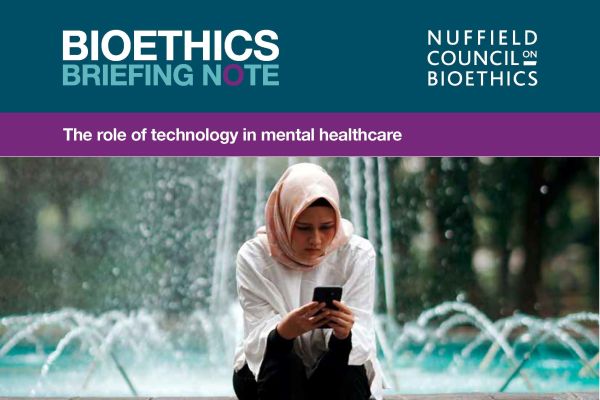Press Release
Better regulation and more evidence is needed for apps and remote technologies for mental health support
Concerns over the effectiveness, safety and quality of technologies such as smartphone apps for people who need mental health support have been raised by the UK’s independent ethics body, the Nuffield Council on Bioethics, in a new briefing. As the market for mental health technologies grows, priorities should include improving the evidence base, and ensuring appropriate regulation. Potential users, their families, and care professionals should be involved in the process.
People who need help with managing their mental health - either through the NHS, or as private consumers – now have a range of healthcare technologies available to support them. These technologies include smartphone apps and chatbots, predictive analytics (using digital data derived from social media and personal devices), virtual reality therapies, and even some brain recording and stimulation devices that are marketed to consumers.
Smartphone apps are widely used and have a number of benefits. For example, giving people more flexibility on where and when they access care, cutting out travel and appointment times, and perhaps offering a new route for anyone who feels uncomfortable speaking in person about their mental health issues.
However, despite having millions of users, many commercially-developed mental health support apps have not undergone rigorous scientific testing and, when they have, they often use a small sample size with no follow-up.
In addition, people affected by mental health problems may not have access to smart phones and apps, or the ability to use them, or would want to use them as part of their treatment, says the Nuffield Council. It points out that the impact of the lack of human contact can be significant, because for some people, using contactless care can increase negative feelings such as loneliness and isolation. And it says that people should always have a choice in whether to use apps as part of their treatment, as well as access to alternative forms of care.
Currently, many mental health technologies do not fall under medical device regulation nor are in scope to be assessed for use in the NHS. To ensure that mental health technology works for all, the Nuffield Council concludes that there is a need for appropriate regulatory frameworks to help users, clinicians and developers navigate the market. To improve public trust and acceptability, service users, their family and care professionals need to be involved in research on technology for mental health and in the development of future regulation.
The Nuffield Council has worked in partnership with the charity Rethink Mental Illness to ensure that insights and views of people with lived experience have fed into this new briefing note. Rethink Mental Illness ran a series of engagement sessions with experts by experience, the findings of which are also published today in a separate report alongside the briefing note.
The findings are intended to inform policy makers, health and care professionals, patient groups, and others involved in caring for people with mental health problems as interest in and use of technology in mental healthcare continues to grow.
Danielle Hamm, Director of the Nuffield Council on Bioethics, said:
“As a society we need to find the best ways to support people who are struggling with their mental health. As the Government embarks on a new 10-year mental health and wellbeing plan, we would like to see improvements in the evidence base and regulation of mental health technologies, through involving the people who need and use them, to help ensure that mental health technology works for all.
We would like to thank all the people who took part in workshops run by Rethink Mental Illness for their extremely valuable contributions and for talking about their personal experiences so honestly and thoughtfully. We will be taking this briefing note to policy makers, the NHS and others involved in mental health provision with the aim of ensuring that these important ethical considerations are fed into policy making from the outset.”
Brian Dow, Deputy Chief Executive, Rethink Mental Illness said:
"Technology has the potential to transform people’s experience of mental health services and enhance the range of support that can be offered to them. But in our enthusiasm to embrace new technology, people with lived experience must be closely involved in its development to ensure that it is safe, effective, and truly meets their needs. These conversations must be ongoing as they’re key to building a sense of confidence and ownership that can make emerging technologies a useful part of treatment and care in the future.”
Dr Sofija Opacic, mental health carer and participant in Rethink Mental Illness engagement sessions, said:
"Being part of this fantastic research project with Rethink Mental Illness and the Nuffield Council on Bioethics helped me get to grips with a complex change: emerging digital mental health technologies. Talking through some tough issues helped firm up my ideas; and shunted me onto my next step: developing a simple but strong mental health carers' charter – helping to support mental health digital take up - to help influence positive, impactful change in the world”.

The role of technology in mental healthcare
Read our bioethics briefing note.
THE ROLE OF TECHNOLOGY IN MENTAL HEALTHCARE
Share